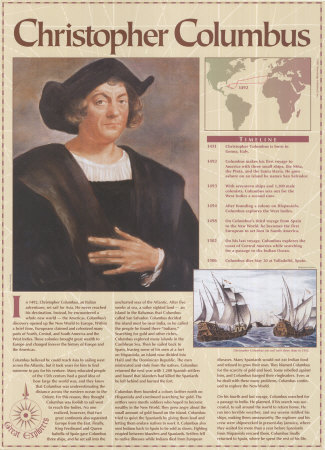
After death, Columbus' body underwent excarnation where the flesh was removed so that only his bones remained.

Columbus was buried without fanfare with only a handful of people in attendance. After three years, Columbus' bones were moved to the monastery of La Cartuja in Seville, in accordance with his eldest son Diego's wishes. Diego died in 1526 and was buried beside his father. Columbus rested in peace for over two centuries in the place he wished to remain.

In 1795, the French captured the island of Hispaniola from Spain. Though he died in relative obscurity, by the late 1700's, Columbus's remains were viewed as a national treasure by Spain. The box bore Columbus' name and an urn bore the inscription "The illustrious and distinguished male, Don Christopher Columbus."

Columbus' tomb in the cathedral of Seville was guarded by four statues of kings, as it remains today.

So where are the bones of Christopher Columbus?
Researchers in Spain claimed in 2006 that they had definitive proof that the explorer's bones were in Seville. Juan Bautista Mieses, the director of the Columbus Lighthouse - a cross-shaped building several blocks long in Santo Domingo - dismissed the researchers' findings and insisted that Columbus was indeed buried in the Dominican Republic.
Monday is Columbus Day, time to buy appliances on sale and contemplate other things that have nothing to do with Christopher Columbus. 1. Columbus set out to prove the world was round.
This text was well known throughout educated Europe in Columbus' time. [Related: Earth Is Flat in Many People's Minds]
Columbus, a self-taught man, greatly underestimated Earth's circumference. Columbus, in effect, got lucky by bumping into land that, of course, wasn't Asia.
The Columbus flat-earth myth perhaps originated with Washington Irving's 1828 biography of Columbus; there's no mention of this before that. 2. Columbus discovered America.
If Columbus discovered America, he himself didn't know. [Top 10 Intrepid Explorers]
3. Columbus introduced syphilis to Europe.
Syphilis was present in pre-Columbus America. Carbon dating and DNA analysis of bones from the friary support the theory of syphilis being a worldwide disease before Columbus' voyages.
4. Columbus died unknown in poverty.
Columbus wasn't a rich man when he died in Spain at age 54 in 1506. 5. Columbus did nothing significant.
With all this talk of a hapless Columbus accidentally "discovering" the New World, as well as the subsequent genocide of native cultures, it is easy to understand the current backlash against Columbus and the national holiday called Columbus Day, celebrated throughout North and South America.
Source :
http://www.msnbc.msn.com/id/44846249/ns/technology_and_science-science/
http://www.ibtimes.com/articles/228407/20111010/columbus-day-christopher-columbus-bones-spain-dominican-republic.htm
